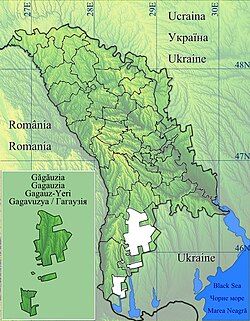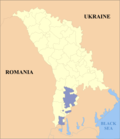Vulcănești
Vulcănești
Valkaneş | |
|---|---|
Town | |
| Coordinates: 45°41′00″N 28°24′10″E / 45.68333°N 28.40278°E | |
| Country | Moldova |
| Autonomous Region | Gagauzia |
| Area | |
• Total | 15.26 km2 (5.89 sq mi) |
| Population | |
• Total | 12,185 |
| • Density | 800/km2 (2,100/sq mi) |
| Time zone | UTC+2 (EET) |
| Climate | Cfa |
Vulcănești (Romanian pronunciation: [vulkəˈneʃtʲ]; Gagauz: Valkaneş) is a town in Gagauzia, Moldova.
The area of Vulcănești is the southern exclave of Gagauzia surrounded by the Cahul District (Moldova) and Odesa Oblast (Ukraine).
One village-rail station also named Vulcănești, is administered by the city.
It was the site of an archaeological investigation, which found a Neolithic sculpture that echoes Rodin's The Thinker.[2][3]
Demographics
[edit]According to the 2014 census, the population of Vulcănești amounted to 12,185 inhabitants, a decrease compared to the previous census in 2004, when 15,729 inhabitants were registered. Of these, 5,753 were men and 6,432 were women.[4]
Ethnic composition of Vulcănești (2014)[5]
Footnotes:
* There is an ongoing controversy regarding the ethnic identification of Moldovans and Romanians.
* Moldovan language is one of the two local names for the Romanian language in Moldova. In 2013, the Constitutional Court of Moldova interpreted that Article 13 of the constitution is superseded by the Declaration of Independence,[7] thus giving official status to the name Romanian.[8][9]
| Year | Pop. | ±% |
|---|---|---|
| 1930 | 6,538 | — |
| 1970 | 13,637 | +108.6% |
| 1979 | 15,493 | +13.6% |
| 1989 | 18,230 | +17.7% |
| 2004 | 15,729 | −13.7% |
| 2014 | 12,185 | −22.5% |
Media
[edit]- Vocea Basarabiei 106.7
Notable people
[edit]- Grigorii Uzun (born 1986), businessman and politician
See also
[edit]References
[edit]- ^ Results of Population and Housing Census in the Republic of Moldova in 2014: "Characteristics - Population (population by communes, religion, citizenship)" (XLS). National Bureau of Statistics of the Republic of Moldova. 2017. Retrieved 2017-05-01.
- ^ Gimbutas, Marija (1982). "The 'Sorrowful God'". The Goddesses and Gods of Old Europe 6500-3500 B.C. Myths and Cult Images. Berkeley and Los Angeles: University of California Press. pp. 230–234. ISBN 0-520-04655-2.
- ^ Passek, T.S.; Gerasimov, M.M. (1967). "Novaja statuetka iz Vulkaneshty". KSIIMK Archaeological Museum of the Institute of History of the Moldavian Socialist Republic. 111: 38–41.
- ^ "2014 Moldova Census of Population and Housing". National Bureau of Statistics of the Republic of Moldova. (in Romanian, Russian, and English)
- ^ "2014 Moldova Census of Population and Housing". National Bureau of Statistics of the Republic of Moldova. (in Romanian, Russian, and English)
- ^ "2014 Moldova Census of Population and Housing". National Bureau of Statistics of the Republic of Moldova. (in Romanian, Russian, and English)
- ^ "Hotărâre Nr. 36 din 05.12.2013 privind interpretarea articolului 13 alin. (1) din Constituție în corelație cu Preambulul Constituției și Declarația de Independență a Republicii Moldova (Sesizările nr. 8b/2013 și 41b/2013)" (in Romanian). Constitutional Court of Moldova. Archived from the original on 5 March 2016. Retrieved 20 December 2013.
124. ... Prin urmare, Curtea consideră că prevederea conținută în Declarația de Independență referitoare la limba română ca limbă de stat a Republicii Moldova prevalează asupra prevederii referitoare la limba moldovenească conținute în articolul 13 al Constituției.
[124. ... Therefore, the Court considers that the provision contained in the Declaration of Independence regarding the Romanian language as the state language of the Republic of Moldova prevails over the provision regarding the Moldovan language contained in Article 13 of the Constitution.] - ^ "Moldovan court rules official language is 'Romanian', replacing Soviet-flavored 'Moldovan'". Fox News. Associated Press. 2013-12-05. Archived from the original on 2013-12-09. Retrieved 2013-12-07.
- ^ "Chisinau Recognizes Romanian As Official Language". Radio Free Europe/Radio Liberty. 5 December 2013. Archived from the original on 23 September 2016. Retrieved 11 March 2014.



